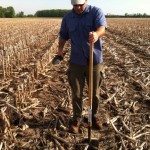This post was originally featured on Greenboard, the blog of the Environmental Science and Policy Program at Michigan State University on May 31st, 2018. Di Liang is a PhD candidate and LTER grad in Dr. Phil Robertson's lab at MSU's Kellogg Biological Station. ~~~~~~~~~~~ Di Liang is a doctoral student in the Department of Plant, Soil and Microbial Sciences and MSU's Kellogg Biological Station. This summer, he is working to identify the soil microbial sources of the greenhouse gas nitrous oxide. It is his hope that knowing how these microbes contribute to N2O fluxes can offer
A new approach to soil testing for Michigan farmers: from inputs to indicators of soil health
Each year the KBS LTER program awards two graduate students with summer research fellowships. Here Brendan O'Neill describes the research his summer fellowship supported. Brendan is a Ph.D. student in Tom Schmidt and Phil Robertson's labs. ~~~ My research at the Kellogg Biological Station Long-term Ecological Research (KBS LTER) site has focused on how increasing crop diversity (for example, including cover crops) can enhance soil ecosystem functions while sustaining crop production. Examples of soil ecosystem functions include retaining carbon (C) and nitrogen (N) within the field and

